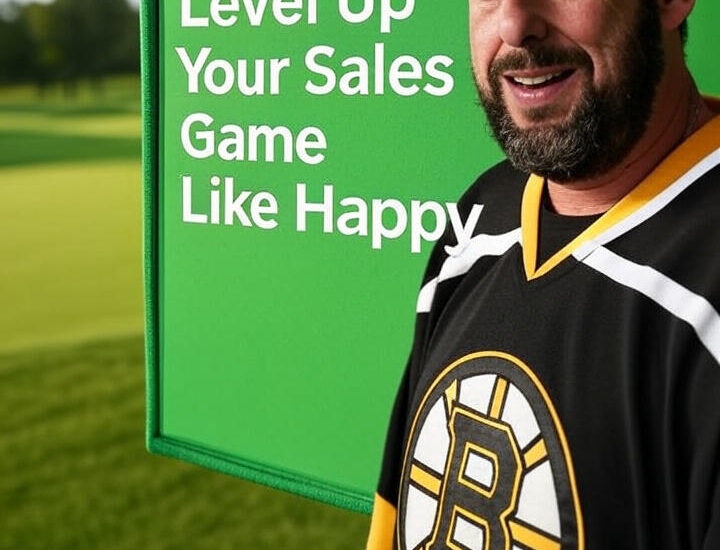- July 28, 2025
- Posted by: Dave Kurlan
- Category: Understanding the Sales Force

If you can make me laugh for two hours straight then I’m all in.
I know that Adam Sandler isn’t everyone’s cup of tea, especially if you like your movies to be well-written, well-directed, well-produced and well-acted. However, if you’re OK sitting back and simply laughing at the utter silliness of one of his movies, then join the club.
Our family watches Grown Ups every year, and Happy Gilmore was perhaps one of the best comedies he ever made so we got together and watched Happy Gilmore 2 on Friday. While it won’t go down in history as a great movie, it delivered two hours of non-stop laughing. A movie doesn’t have to be great to make you laugh your ass off!
Let’s focus on the serious side of Happy Gilmore 2 and its lessons for salespeople. First a spoiler alert. The plot has much in common with the original, with Happy broke again and needing money to send his daughter to a dance school in France. John Daley urges Happy to return to professional golf, which he hasn’t played in years, because a top 30 finish will provide the payout he needs.
Unfortunately for Happy, he is now so bad at golf that he loses badly to a group of young, inexperienced amateurs at a municipal course. He makes the decision to rededicate himself to golf excellence and stops drinking, while adding non-stop practice, golf drills, and getting into golf shape.
Unserious Happy Gilmore gets serious about perfecting his golf game.
Why do so few salespeople get serious about perfecting their sales capabilities? We know the stats. Based on data from Objective Management Group (OMG) which has assessed more than 2.5 million salespeople in 21 Sales Core Competencies (stats), there is a small group (7%) with elite skills, another group (18%) that is quite strong, and then the rest. Yes, 75% of all salespeople are incredibly mediocre, or worse.
But that’s not new. It’s been that way for decades. Today’s question is not why companies don’t fix this problem, it’s why don’t salespeople go the Happy Gilmore route and dedicate themselves to improving their sales capabilities? Why don’t they practice every day? Why don’t they participate in drills? Why don’t they get into top selling shape?
Below I have listed ten, but not all of the possible answers:
- Commitment. 37% of salespeople lack Commitment to success in sales and from among the bottom half of all salespeople, that percentage is 50%. That’s not very strong commitment!
- Motivation. 21% of salespeople aren’t Motivated to do more, with many of them limited by what they can earn due to compensation plans that do not properly incentivize salespeople.
- Complacency. Many salespeople are overpaid, earning commissions on accounts they inherited. This also leads to these salespeople doing little to generate new business.
- Consequences. Between 58-82% of salespeople fail to meet quota, most suffering no consequences. Why should they change anything? Condoning, or even embracing failure leads to more failure!
- Lack of Awareness. 2.5 million B2B salespeople have been assessed by OMG, but most salespeople are not aware of their selling gaps. So why should they change anything?
- Expectations. Sales Managers pressure their salespeople for orders and revenue, but few salespeople are pressured to improve their skills.
- Culture. Most sales organizations lack a true sales culture so the emphasis is not on sales best practices or improvement. These organizations are in great need of sales transformation
- Leadership. Baseball and sales share many similarities, but most sales leaders strike out on the sales equivalents to batting practice and fielding practice.
- Money. Professional sales training, coaching, and sales courses cost money and most salespeople don’t believe they should invest in their own careers.
- Avoidance. People have a lot going on in their lives and most salespeople prefer to do other things instead of sales self-improvement and study.
Improved sales effectiveness and capabilities don’t arrive from Amazon via overnight delivery, and it isn’t easy, but organic growth has a cost of admission and that’s the cost of training and coaching salespeople and sales managers. Avoid it at your own risk or embrace it with our help.

